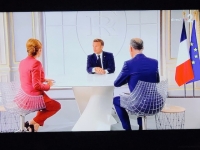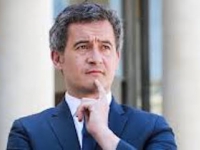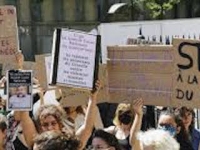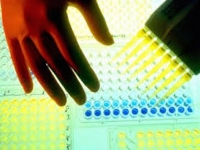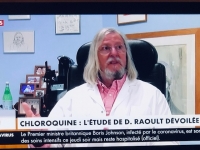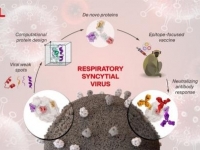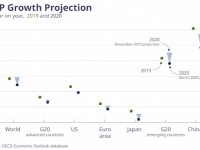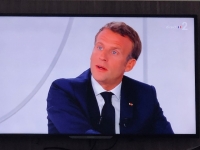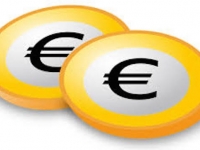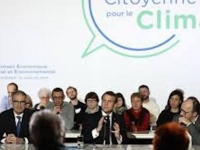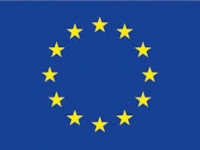Politics
PDT MACRON INTERVIEWED ON TV OVER THE JULY 14 NATIONAL DAY- PART 2
GERALD DARMANIN IS PRESUMED INNOCENT
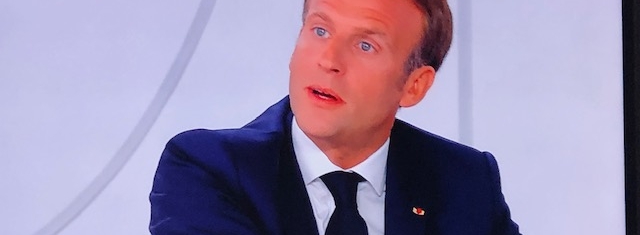
President Macron interview Lea Salame Gilles Boule (Source: TV caption Tf1 tv France 2)
USPA NEWS -
At the end of the ceremony of July 14, which was this year in a reduced and unprecedented format, by honoring the workers of the confinement period on the first line, the President of the Republic, Emmanuel Macron replied to questions from Lea Salame and Gilles Bouleau journalists respectively from the TV channels, France 2 and TF1. President fixed a calendar of next actions, for the remaining 600 days of his mandate, as well as for the next 10 years, of the "reinvention » of France post COVID-19. The Head of State explained that putting youth in priority in the exoneration of charges mechanisms for the next, around 1 million youngsters <25 years old freshly graduated will present themselves on the labor market next spring“¦ The most tense moment of the interview was when President Macron assumed on the basis of the presumption of innocence towards Gerald Darmanin, the new Minister of the Interior whose appointment created a controversy and feminist protests demanding his resignation because he is the subject of complaints of "sex drive and rape" from a complainant. We Publish the second and last part of this interview held at Elysee Palace, conducted by Lea Salame & Gilles Bouleau
THE APPOINTMENT OF GERALD DARMANIN MINISTER OF THE INTERIOR AIMED BY AN INVESTIGATION FOR RAPE CAUSED THE EMOI AND ANGER OF FEMINISTS
LEA SALAME (France 2 TV): Mr. President, you have erected the fight against violence against women as a major national cause. So, of course, there is the presumption of innocence, but do you understand that the appointment of a man targeted by a rape investigation as head of the Interior Ministry, a ministry which is precisely very important when it comes to acts to combat violence against women, which this appointment causes excitement and anger.
PRESIDENT MACRON: First, I always respect the excitement and anger of just causes. And so the feminist cause, I share it. I have made a common thread of this five-year term and fighting against violence against women, fighting for real, effective equality between women and men is a fight on which I will not give up anything. We have also made several advances, passed important laws by recognizing new crimes. We have started deploying resources. It's not going fast enough, I know the expectations of associations. Since the beginning of this year, 1,000 places have been freed up to protect. We will start in September, finally, and I know that it is too slow for many, to deploy the electronic bracelets which allow there too to protect better, the telephones great distress started to be deployed too. So we will continue to accelerate
LEA SALAME (France 2 TV): This nomination ..
PRESIDENT MACRON: I am already talking about the substance because my fight every day and what I want us to meet is the requirement of associations, is to have even more accommodation places, it is to deploy these bracelets faster, it is to have the 39 19 available 24 hours a day, 7 days a week. So that, we will be at the rendezvous of the facts. Then you have a politician who has been charged, serious.
GILLES BOULEAU (TF1 TV): Gérald DARMANIN.
PRESIDENT MACRON: The Minister of the Interior, Gérald DARMANIN .. several years ago since it was at the start of this five-year period, on facts which go back much further. As you said, there is the presumption of innocence. Under your control, this matter has already been the subject of several investigations, and on several occasions has been closed or has given rise to an absence of follow-up.
LEA SALAME (France 2 TV): Yes, but there are the two largest jurisdictions.
PRESIDENT MACRON: There is a procedure which, for reasons of form, comes up again.
LEA SALAME (France 2 TV): The Court of Cassation and the Court of Appeal.
PRESIDENT MACRON: It's not mine - I'm just telling the facts.
LEA SALAME (France 2 TV): Yes.
PRESIDENT MACRON: It is not for me to judge. I know very simple things. As true as I believe in the strength of just causes, I think that no cause is defended precisely if it is done by flouting the fundamental principles of our democracy. And I say it for a minister as I would say for any citizen. I am also from where I place myself the guarantor of this presumption of innocence. And I say it in the reports also that our democratic life could have with our judicial life. If, from the moment someone is accused cannot have political responsibility, our democracy changes its nature. It becomes a democracy of opinion. Me, you know, for France, I want the best of our country. I do not want the worst of Anglo-Saxon societies.
GILLES BOULEAU (TF1 TV): But in the case of Mr. DARMANIN, you did not hesitate a second before appointing him to this position.
PRESIDENT MACRON: But I had a discussion with him because he is a politician who is intelligent, committed, who was also injured by these attacks. So there is also a relationship of trust from man to man, if I may say so. The President of the Republic and a minister appointed on the reality of these facts and their consequences. I know that he himself is sensitive to this in order to be able to exercise his functions with dignity. But what I say here is important because I cherish this just cause of the fight against violence and effective equality between the sexes. But I cherish what can make our democracy, an even stronger democracy, that of not yielding to constant emotion.
GILLES BOULEAU (TF1 TV): Mr. Speaker, France is emerging from a terrible ordeal. The epidemic, the containment. Some are already talking about a second wave. Do you have information from experts, epidemiologists, nursing homes (nursing homes), hospitals? Is this information you have worrying or not?
PRESIDENT MACRON: First, all the information I have, you have it too. They are shared. And since the first day, this is what we have been obliged to do, it is a daily transparency, at least daily, to tell where we are and how things are evolving. We came out of the first peak which led us to this confinement, to this decision if it is difficult with obviously these deaths that we had to live, more than 30,000 of our fellow citizens have now died of this virus, and a bitter fight led by our carers, but with them too, elected officials, state officials. What I called these first, second and third line. The whole country has mobilized and we have had results since we have managed to contain the virus and have returned to almost a normal life. I say this because that is the whole Nation that succeeded. And look at some other countries, it was not obvious and it is not given. And so, French women can be proud of them.
LEA SALAME (France 2 TV): True, but ...
PRESIDENT MACRON: Today we have uncertainties. All the difficulties of this period that we lived, it is that one must decide in bad weather without knowing everything. And we have all experienced what can also be controversies between scientists. There is not a line or a doctrine. There are those who say to you firm: there will be no second wave. There are those who tell you: it is coming soon and for sure. What I see“¦
LEA SALAME (France 2 TV): There, you don't know?
PRESIDENT MACRON: What we are seeing is that there are countries where it is starting very strongly. The United States of America, for example. There are in many neighboring countries indices, a recovery and ourselves, we have certain indicators that we are monitoring, the effective R which is increasing, which has risen a little above 1. What wants to say that a person who has the virus transmits at least one person the virus.
GILLES BOULEAU (TF1 TV): And the doctors are seeing patients return ...
PRESIDENT MACRON: That means it is accelerating. And you're right, the early emergency calls. So there are signs that it is starting again anyway. Faced with this, we must warn and prepare. Warn, what is it? We learned during this period and we learned how this virus was transmitted, better than at the beginning. The best prevention is what is called barrier gestures against the virus. Masks, keep away and hydroalcoholic gel. And so, we must continue to apply these barrier gestures. On this, we see weaknesses. So, I asked that we pass a step to the Government and I hope that in the coming weeks, we will make the mask mandatory in all closed public places. We do it in transport, it works very well, but it's a bit erratic in closed public places. The protocols, for example, the restaurant works very well, must be respected, but ...
LEA SALAME (France 2 TV): In stores.
PRESIDENT MACRON: In stores, etc.
GILLES BOULEAU (TF1 TV): On what date, Mr. President?
PRESIDENT MACRON: It means that things have to be organized. We are not going to do it overnight but I recommend to all our fellow citizens who listen to us to wear the mask as much as possible when they are outside and a fortiori when they are in a closed place. And we will observe the situation, but put ourselves in a position of power, for example from August 1, make it fully mandatory.-------------------------------------------------------------------------------------------------------------------------
GILLES BOULEAU (TF1 TV): So the shopping centers in which, on the right, a store is prohibited for unmasked people and next to it, 10 meters away, is open to masked people, is it finished on August 1?
PRESIDENT MACRON: The charm of France. We say the uniform rules“¦
GILLES BOULEAU (TF1 TV): It is still public society that is at stake.
PRESIDENT MACRON: I agree. But why am I jokingly saying that? You are telling me: it is not consistent. The charm of France is that we are against uniform rules by saying: this is completely absurd. And as soon as there are no uniform rules, we ask for them. So yes, I think we have to take a step. But the most important is my recommendation is to put some. Then, in outdoor events, when you have a good distance, you are not necessarily required. There too, it is more prudent. We saw.
GILLES BOULEAU (TF1 TV): Le Teknival.
PRESIDENT MACRON: We have seen recent events, put on masks, put on masks.
LEA SALAME (France 2 TV): Or some of your ministers who kissed without masks during the handover.
PRESIDENT MACRON: It was the emotions of handover. The Prime Minister told them, and you found that after the rules were strictly observed. I say that and I say it also for our young people because we asked enormous efforts from our youth in this period. And I hope we come back to it because for me it's ...
LEA SALAME (France 2 TV): We'll talk about it obviously. We're going to talk about it.
370,000 PCR TESTS FOR COVID-19 ARE NOW PERFORMED PER WEEK------------------------------------------------------
PRESIDENT MACRON:“¦ one of the red threads for the next few months, the next few years. But, our young people often have light forms. And when we look at mortality, it is overwhelmingly the oldest who die. And so, they might think, because they have so-called asymptomatic forms, that it doesn't matter, that they can take all the risks. Simply put, when they take these risks, they accelerate the spread of the virus and they can spread it to others, to seniors. So, here is the mask and we protect. This is the first ... The first pillar of the strategy. The second is testing. They have been widely deployed. We must be at nearly 370,000 tests per week when I speak to you.
GILLES BOULEAU (TF1 TV): It must have been 700,000.
PRESIDENT MACRON: Sorry?
GILLES BOULEAU (TF1 TV): Your Minister of Health, Olivier VERAN said: it would be 700,000 per week.
PRESIDENT MACRON: We have the capacity. Simply, the demand today is not there. So what we are going to do, what I asked the government to do is to open up. We have the capacity, we have the capacity to do them. We have the capacity of principles and reagents to deploy them. Simply, what we will encourage is to allow all people, without medical prescription, even when they have no symptoms, if they have any doubts, a fear of being able to go get tested. Because it is a good way, then, once you are tested, to be isolated and to reduce the diffusion. And then the third thing is to prepare for the peak, if there really was one.
LEA SALAME (France 2 TV): So precisely, Mr. President, to be clear, we have to move forward because we absolutely have to hear you on the economic recovery. But one or two more questions on the COVID-19 to be very clear. You admitted in your speech last April that there were flaws and shortcomings. If there is a second wave coming, will we be ready this time? Will there be enough masks, gel, tests, respirators, medication? Or do we risk a new shortage?
PRESIDENT MACRON: Yes, we will be ready. We will be ready and this has been prepared under the authority of the Prime Minister, with the Minister of Health, but all the competent ministries, the competent services, so that we have the right stocks in good quantity, because now also we see in period, if I may say, of extreme crisis, how much is consumed? It was much more than what was in all the projections, more than 10 times more. And so, now, we know what we consume: masks, respirators, indeed, curares, drugs. And we have both stocks and supplies that are secure. And we have the organization as close to the field as possible to face an upsurge if it were there.---------------------------------------------------------------------------
LEA SALAME (France 2 TV): So no more mistakes.
PRESIDENT MACRON: In any case, everything that we have learned, everything that we know how to plan and model, has allowed us to organize ourselves.
AVOID THE SECOND WAVE OF THE COVID-19 EPIDEMIC DEPENDS ON US--------------------------------------------
GILLES BOULEAU (TF1 TV): Question that interests all French people. If there is a reconfiguration, which is not a school hypothesis, will it be a global reconfiguration? 60 million French people. A reconfiguration by canton, by city? We saw several neighborhoods in Lisbon. We saw Melbourne, 5 million inhabitants. Would it be like that or would it be, for example, confinement of the people whom you said were the most fragile? The over 70s are isolated, even if it means depressing and depreciating them. What are you going to do ?
PRESIDENT MACRON: So first, we took the most radical, hardest step, which was containment. It is also the most basic, if I may say so, with loads of consequences. You recalled it hollow on the other diseases, with people who did not go to seek treatment. Psychologically and psychiatrically, with many people who have suffered. In terms of social injustices because being confined to a house where you have a garden is not the same as being confined to an apartment with several people. Being confined to a house where there is no Internet is not the same as being permanently connected. And therefore, containment was a revealer of inequalities. I don't want this again for the country. And so we are doing everything to avoid a new wave and to have a differentiated approach if it appears. The masks, the tests and then, if a new wave arrives, to isolate as locally as possible and therefore as quickly as possible. This is why you have to test.
GILLES BOULEAU (TF1 TV): But we can, we can re-isolate the Mayenne. I say Mayenne because ...
PRESIDENT MACRON: We can. It is the health authorities who know which is the right mesh. But remember what we did at the beginning, at the beginning of the crisis in the Oise, we were able to isolate, sometimes at the level of a town from a few schools, because we knew how to go back to the people who were contaminated , those who had approached them. And so, that's what we would do if there was an acceleration again. The key is to be vigilant across the country. And I say this for all our fellow citizens: we are the actors in the fight against the virus. If we don't want a second wave, it depends on us, protecting us, testing us, organizing ourselves.
QUASI RETURN TO SCHOOL NORMAL ON SEPTEMBER 1 IN THE EPIDEMIC COVID-19---------------------------------
LEA SALAME (France 2 TV): September 1, back to school, do you know today, July 14, how will it be? Will the 12 million students from kindergarten to 12th grade make a normal start of the school year?
PRESIDENT MACRON: It will be as normal as possible. There is a circular that came out a few days ago that was prepared by the minister. We are able to welcome all the students with the right organization. We have learned a lot. The school, our teachers have learned a lot too, and I want to salute their commitment and their work during this period. We have developed online education. We have developed a new way of teaching students. Here we have a challenge. During the summer at the start of the school year, we will have to go and find the children who have suffered the most from confinement, what are sometimes called dropouts. I don't really like this term. We can call them catchy, because we will need their vitality, their strength and we will have to help them. The Minister is preparing a return to school where teachers will be well protected, where we will have the right organization with, if peaks returned, the possibility of adapting. But I can tell the families today that we have put ourselves in a situation of having a nearly normal back-to-school period, to continue living with the virus if it remains at this level. Obviously, if there was an acceleration during the month of August, we will have to review this return. This is not what I want. If we do things right, we will have a slightly different back to school, even more demanding because we will have to catch up with the past months..
IF PRESIDENT MACRON IS INFECTED WITH COVID-19 HE WOULD NOT TAKE CHLOROQUIN-----------------------
GILLES BOULEAU (TF1 TV): Mr. President, if you tested positive for coronavirus, if you had symptoms, would you take chloroquine?
PRESIDENT MACRON: No.
GILLES BOULEAU (TF1 TV): Did you tell Professor RAOULT when you saw him a few weeks ago?
PRESIDENT MACRON: No, because first, I don't ...
GILLES BOULEAU (TF1 TV): Did you tell him that you don't believe in his method?
PRESIDENT MACRON: It happens that on pathologies that I sometimes have or something else, I happen to self-medicate, because if my wife hears me, I was going to say "I don't self-medicate", she would tell you that I lied. But in this case, given our level of knowledge, from what I understood anyway from science, it was that there was no stabilized treatment. So if there is no treatment, I will not take it, so I would defer to the doctors who follow me who, I believe, would follow the evolution to see how we accompany the most decisive days for prevent it from degenerating. But no, you know, we are the land of Enlightenment. In the land of Enlightenment, I believe in rationality and therefore in scientific rationality. Professor RAOULT, since you mentioned him, is a great scientist, I went to see him to realize, and therefore it was normal and legitimate, from my point of view, for him to participate in the scientific debate. But it is not for the President of the Republic or for a politician to decide a scientific debate with political criteria. It is no more for a scientist, even if he becomes a public figure, to act on scientific beliefs. Science has its verification processes and that's how we get better, I think.
GILLES BOULEAU (TF1 TV): So no chloroquine.
LEA SALAME (France 2 TV): No chloroquine, we understood.
PRESIDENT MACRON: Perhaps in a few months, we will see that it was the right treatment, but today, no one has proven that it was the right treatment.
LEA SALAME (France 2 TV): Today, no chloroquine and no self-medication.
IN THE EVENT OF A VACCINE FRANCE WILL BE THE FIRST COUNTRY SERVED WITH SAID PDT MACRON
LEA SALAME (France 2 TV): Last question quickly: if Sanofi, a French company, found the vaccine tomorrow, in 6 months, do you guarantee that France would be the first country served?
PRESIDENT MACRON: France will be served among the first countries.
LEA SALAME (France 2 TV): Among?
PRESIDENT MACRON: Yes, because Sanofi has started, as we have done with all the groups“¦ I am not going to do with the French groups what I don't want the others to do with their own group . Today, several pharmaceutical groups are looking for vaccines, Sanofi, headquartered in France, a large European group, but you have groups that are British, other Germans, other Americans or Canadians. What is absurd is to say: "We are going to do health nationalism. If it is my company that finds the vaccines will go to my house first." What we built, France took the initiative with the World Health Organization, it is to say: whoever finds a vaccine, we put ourselves in a situation to organize its production everywhere in our countries, for us right away but also for developing countries or the poorest countries. Because imagine for a single second that we find a vaccine that works, that we, we know how to distribute it 15 days, three weeks later because we produce very quickly and have a peak in Africa, in South America . You will say to me: do you know how to produce it for these countries too? This has been called global access to vaccines. And so Sanofi fits into this program. So Sanofi, there have been a lot of controversies, has entered an American program. But in parallel, we engaged Sanofi in a discussion with France and with Europe, to secure the production of medicines on European soil for Europeans at the same time, there too, but also to secure the active ingredients because when we find a vaccine, we forget, we learned in this period, that there are things that are sometimes of little value, active ingredients, certain ingredients, which are not produced here. And if we run out, we create dependence. And so there, we are having discussions with the Japanese, with other Europeans to secure this. So yes, I guarantee you, but what we have worked on is to have truly international access to vaccines. This is the health cooperation in which I believe. There must not be nationalism. You can have industrial patriotism, I believe, but patriotism is the love of one's own, not the hatred of others. There should be no health nationalism in the wrong sense of the word.
THERE WILL BE BETWEEN 800,000 AND 1 M OF NEW UNEMPLOYED IN SPRING 2021
GILLES BOULEAU (TF1 TV): Mr. Speaker, this crisis has also plunged our economy. INSEE expects, by the end of this year 2020, 900,000 more unemployed. It is dizzying. Should we expect this, or less or more?
PRESIDENT MACRON: It is impossible to say the number today.
GILLES BOULEAU (TF1 TV): But does it seem realistic to you?
PRESIDENT MACRON: Yes. When I look at INSEE, the Banque de France, all the institutes that make reference write that there will be between 800,000 and 1 million more unemployed by the spring of 2021. Why? Because we first shutdown our economy for two months and then restarting is very difficult in several sectors. The culture sector has been hit hard and continues to be hit, which is a tragedy for our French art of living, this is also why the recovery plan must be a cultural plan, but what is a drama for hundreds of thousands, millions of our fellow citizens who live working on the occasion of these festivals, events, hotels, cafes, restaurants, tourism, a good part of commerce, public works, building. Many sectors have been impacted, others that are in crisis because there are the global consequences of this crisis that affected everyone: aeronautics, automotive, etc. And so we're going to have social plans, they've started, and we're going to have a massive increase in unemployment. So what must be done is to prepare ourselves collectively, to act to defend existing jobs and to create them as quickly as possible in the sectors that are expanding, and therefore to support activity, support employees and prepare for after. And that's what we did from day one. The famous "whatever it costs" that I said in March was the first response against unemployment because ...
LEA SALAME (France 2 TV): Is it still valid, "whatever it costs", today?
PRESIDENT MACRON: The truth is that it is continuing to deploy, but we are now going to ... It was legitimate, once again, it was legitimate because there was fire in the house and therefore we weren't going to count the buckets. And whatever it costs, it was legitimate because it avoided a social, economic breakdown, with the dramas which accompany it, which we would have paid yesterday or tomorrow, and therefore this effort continues. But how are things done over time? As of March, we decided at a level that no other country in the world has decided. I say this because we can be proud of France sometimes, and in this case, I think we should. We supported employees with a partial unemployment scheme which has no equivalent.
YOUNG PEOPLE WILL BE PRIORITIZED THROUGH INCENTIVES FOR COMPANIES ENCOURAGING THEIR HIRING--------------------------------------------------------------------------------------------------------------------------------------------
GILLES BOULEAU (TF1 TV): Who is the most generous in Europe,
PRESIDENT MACRON: Who is the most generous in Europe, Europe is the most protective continent in the world.
GILLES BOULEAU (TF1 TV): And the most expensive in Europe as well.
PRESIDENT MACRON: It is true that it is more expensive, but why? Because we made sure that there were no layoffs because of the Covid in that period and therefore that people could stay in the company by being paid unemployed or by being paid less to work . So it's true that we distributed a lot of short-time working, and we had more than 40% of employees in our country who were affected by this measure with 84% salary replacement, sometimes supplemented by companies. We made the guaranteed loan to businesses, which allowed freelancers, traders, small businesses but sometimes also larger companies to have cash assistance. We have carried over charges, we even did what had never been done in our History, exemptions from charges, that is to say that in certain sectors: hotels, cafes, restaurants, culture, sports , events, we said: "we cancel the charges". All this allowed us to hold on and avoid destroying too many jobs. There, we enter a phase where the activity is not completely normal. What are we doing ? We will continue to invest to preserve jobs and skills because we learned from the crisis of 10 years ago that if we dismissed too quickly in these periods, we destroy skills for the company and we put people in economic distress. I gathered in this room here, a month and 15 days ago, twice, all the social partners. We had an extremely intense, lively discussion, then they themselves worked with each other, and we decided for the country of a new device, of partial activity of long duration, which allows to keep in the company the employees, sometimes paying them some by agreeing to work a little less, by going to training courses and having the State which abounds with these systems. And so it´s an anti-layoff plan, if I can say so.
LEA SALAME (France 2 TV): But at what cost, Mr. President? When we see ...
PRESIDENT MACRON: At a very significant cost.
LEA SALAME (France 2 TV): Yes, but at what cost also for the employees? Mr. President, when we see in certain companies like Derichebourg, an Airbus subsidiary, employees are asked to lower their wages by 20% in order to keep them. You, if you were an employee, if your boss came to tell you “either you lower your salary by 20%, or I can't keep you.“ What would you do? Do you accept the deal or say it's unacceptable blackmail?
PRESIDENT MACRON: First, it must not be blackmail, it must be social dialogue. And that's how we designed it with the social partners.
GILLES BOULEAU (TF1 TV): The choice was not immense, in this case and ...
PRESIDENT MACRON: No, but that's why it's not ...
GILLES BOULEAU (TF1 TV): Dismissal or loss of 20%.
PRESIDENT MACRON: For our country, I prefer the most that there is, and I will come back to it because it is not only the salary that must be lowered. That there are wages that we accept to lower momentarily rather than layoffs because after sometimes, it takes years to return to a job. But it must go through social dialogue, that is to say that what we have designed, what I want and which also contributes to a conviction that I designed and forged in experience c ' is when there is fear, conflict in our country, social dialogue at the branch and company level has incredible value. It has incredible value because it puts people around a table. And when we talk to say things, to share their constraints, no boss wants his employees to work less, none, I will say, they share the same risk. The boss often takes even more risks. And a boss, he rather wants to hire more and have more activity. But sometimes we don't know enough to get around the table. It was my fault too. And so there, this only exists by putting around the table only through social dialogue in the branch, in the company. And by doing what? By saying “we accept wage moderation for a time.“ Me, I wish that it is accompanied and one set up these devices, profit-sharing and participation. Why ? Because it is necessary that the employee who accepts in this period to make an effort, the day when things are better, he is also entitled to his share of the best. This must be accompanied by a moderation of dividends, and this is what we asked of the companies that we abound. That is to say that if employees are told to make an effort, the shareholder must make an effort too. And we are going to make an effort with public money. You know, we are going to put on this device 30 billion euros to sometimes supplement salaries, to finance training, to allow either to be the next day, a better trained, better qualified employee who will earn a better living. , or to go to sectors of activity where there are opportunities because we know that certain sectors will destroy jobs. And so we must use this period, including partial activity, to train, to allow employees to acquire skills without being unemployed, to go to sectors that will create jobs: renovation of buildings, the hydrogen sector, etc.
THERE WILL BE 300,000 PROFESSIONAL CONTRACTS AND OBLIGATION OF HIRING 5% FOR YOUNG PEOPLE
LEA SALAME (France 2 TV): Wait, here we come ...
GILLES BOULEAU (TF1 TV): We're coming, but I want to talk about young people.
PRESIDENT MACRON: You are right because that is our challenge.
GILLES BOULEAU (TF1 TV): In the coming weeks, there will be 700,000 young people from CAP, BEP, up to bac +5, who will arrive on the job market, not counting the other young people from 18 to 23 years who are today, for a large number, unemployed. What are you going to do to get companies to hire them? Are you going to lower the charges? Are you going to do jobs with zero payroll taxes? Are you going to give bonuses to these companies?--------------------------------------------------
PRESIDENT MACRON: So you're right, our youth should be the priority of this revival. I say priority because it was our youth that we asked for the greatest effort. Do not exit. Don't go to party. Not being able to take exams. Sometimes having to give up your first hire. And she lives in the anguish that we all know at that age, which is an age of transition. What have we already done? One to say “We must not lose the battle of learning, of work-study, of all professional contracts.“ It is one of the great victories of the first 3 years. In our country, we always said “We have to learn, etc.“ We couldn't do it. We simplified the rules, simplify funding. It was taking off. And so there, we put on the table a device where we pay massively the first year.
GILLES BOULEAU (TF1 TV): Are you going to go beyond?
PRESIDENT MACRON: Here we are going beyond all that had been done until then. And so, we support companies up to 250 employees without any conditions and above 250 employees, we tell them “Make your 5% apprentices.“ And there, I say responsibility because we all have a responsibility in these moments, when I see companies, large companies who prefer to take on interns and precariousness rather than sign a professional contract or sign with a work-study student, it's irresponsible.
LEA SALAME (France 2 TV): No, but are you going to compel them by law?
PRESIDENT MACRON: We encourage them. So we have to be very careful in this matter because with good intentions, we end up with the worst, if we are forced to by law. We are going to follow them, we are going to encourage them, we are also going there through dialogue and construction.
LEA SALAME (France 2 TV): If we tell them, "Enough, interns", first they will say "Yes, yes" ...
PRESIDENT MACRON: First you are told “Look.“ But we follow things when we say them and I asked the Ministry of Labor to focus on this device. But I'm not going to tell you “We're going to pass a law to ban internships“ because internships also have their merits. But I say there, there is a side effect and therefore learning, professional contracts, unprecedented help so that we have hires in this first year. Then, we are going to have an exceptional exemption from charges for young people, in particular for low qualifications and jobs up to 1.6 times the minimum wage, exceptional because it will last 1 to 2 years, we will assess it . But there has to be this element of acceleration. And above all, we will create new mechanisms. 300,000 integration projects and contracts which enable young people who are sometimes the furthest from employment to be sought, who have not managed to find the company who signed their apprenticeship or work-study contract . And so these, we are going to get them with integration contracts. We are creating 300,000. We are going to create a formidable accelerator on the civic service that works, the quality of which we have seen. We have about 140,000 civic service contracts today. We will create 100,000 in the next 6 months. 100,000. So almost a doubling. Again, because it's a solution we give to young people. And finally, we are going to allow young people who had to enter the job market to perhaps complete their training, to have a semester or a year of study in addition. And so, we are going to open 200,000 places in higher qualifying training courses to allow a young person who has absolutely no way out, no prospect of hiring, to continue their studies a bit, with social support.
THE PENSION REFORM IS "JUST" AND ALLOWS SMALL SALARIES A MINIMUM CONTRIBUTION TO 1000 €
LEA SALAME (France 2 TV): Mr. President, there are still a lot of questions. We had a strike in December and January, probably the longest that France has known for 100 years, against your pension reform. Today, all the unions, from the CGT to the Medef, tell you “Above all, don't put the pension reform back on the table for us. Now is not the time, it is not the time. “ Why do you persist in absolutely making this pension reform there, right away, when we are in a major economic crisis?
PRESIDENT MACRON: But I don't insist on doing it right away, I can assure you.
LEA SALAME (France 2 TV): So you don't do it?
PRESIDENT MACRON: No, no. So you see right away, you transform, you ... It cannot be done as it was fitted before the Covid crisis. Is it a good idea to give it up completely? I do not believe.
GILLES BOULEAU (TF1 TV): Amend it, yes.
PRESIDENT MACRON: Put it back for discussion, for consultation. And why ? First, because there are two things in this reform. There is the reform of the universal point system. I think this reform is fair and it is made for those who were called the first on the chore, the women and men who were on the front line, cashiers, delivery men, modest trades, often with part-time work suffered , this pension reform, they are the big winners. Because I remind you that in this reform, there is also the best taking into account of their periods of activity. There is also an unprecedented social advance that is retirement at 1,000 euros for everyone, the minimum contribution at 1,000 euros.
GILLES BOULEAU (TF1 TV): What if you have contributed all your life?
PRESIDENT MACRON: Contributory minimum, that is to say, not the system which is the minimum non-contributory old age. And so, these are social advances for these people. It is true that in the reform of the points system, we came back to advantages which had been acquired over time by other regimes, for example, special regimes. I believe this reform is fair. It may be necessary to give it a little more time, to coordinate it better. We have to put it back on the book. Besides that, there was the financial aspect of the reform. I was elected at a time when the pension orientation committee said “There is no problem with funding.“ I myself assumed before the French to say "There will be no age measures because there is no problem of funding." Six months after my election, the same committee began to say, "There is a funding problem." And this problem has gotten worse. Is it more serious? We'll have to ask them now.
GILLES BOULEAU (TF1 TV): Well, he is very serious. 30 billion. We went from 4 billion to 30 billion, that's serious.
PRESIDENT MACRON: So you can see that we have two duties before us and I say this because it is not in the hands of the Government, retirement is the heritage of those who do not have it. To say “We pretend there is no problem“ is to say “I am sacrificing the heritage of those who do not have one.“ That is to say, “I take the risk of not being able to pay for retirement tomorrow.“ So we have to face our retirement system like all of what we are doing.
GILLES BOULEAU (TF1 TV): And how do you finance it? And so the pivotal age is over, the pivotal age of Edouard PHILIPPE is it over?
PRESIDENT MACRON: In method, no, we're going to do method.
GILLES BOULEAU (TF1 TV): So increase the number of quarters worked?
PRESIDENT MACRON: I have already shown my openness on all these subjects
LEA SALAME (France 2 TV): Your preference.
PRESIDENT MACRON: My opening. I say it is not for the President of the Republic to give a July 14 what will be the pension reform.
PRESIDENT MACRON: I am explaining to you that universal reform is fair and good reform and that we will not economize on reforming our pension system to make it viable. And therefore the Prime Minister
GILLES BOULEAU (TF1 TV): But right away
PRESIDENT MACRON: No, but we will do it methodically. It is up to the Government to do so. Prime Minister Jean CASTEX will bring together all the social partners at the weekend on Friday to put everything on the table, everything: what we do for health, what we do for addiction. We are creating a new risk, with funding also where until now everyone had always backed down, that is to say we will finance old age. We have to explain to each other how we finance it. Retirement, work, so put all the topics on the table. And give, between the Government and the social partners, a shared calendar. But let me be clear: the priority for this summer and the next school year is employment. It is the fight for our young people to have either training or a job and that no one is without solution, it is the battle to preserve all the jobs that we can preserve and to create all the new jobs possible. This is the priority.
LEA SALAME (France 2 TV): So if you can't agree on pension reform with the social partners, you say "we're waiting"?
PRESIDENT MACRON: No. I say, what the Prime Minister is going to have to do with the members of his competent government and the social partners is to define the relevant timetable which allows one to be lucid. We all know what the reality is.
GILLES BOULEAU (TF1 TV): Finally, it's somewhere, it's neither now nor the Greek calendars, it's somewhere.
PRESIDENT MACRON: I like this spirit of synthesis. That's it. At some point, and in a process that will have to be engaged
GILLES BOULEAU (TF1 TV): You will have to go there, being your president, that's what I mean. It´s not for your successor´s successor?
LEA SALAME (France 2 TV): Yes, right, at the end of your five-year term, do you make this pension reform?
PRESIDENT MACRON: It is obvious that in any case in the coming years, and I do not want to put a political reference on this, but in the coming years it will be necessary to carry out a pension reform. I am in favor of a far-reaching reform which also makes the system fairer. But it is obvious and we would be lying to our fellow citizens to say that we can save it.
THERE WERE 460 MILLION SPENDING DURING CONTAINMENT WITH THE MOST GENEROUS PARTIAL UNEMPLOYMENT OF EUROPE-------------------------------------------------------------------------------------------------------------
LEA SALAME (France 2 TV): Mr. President, all the money you have put on the table, you have just said, to cushion the economic shock of the epidemic, we will have to find it. Are you officially making a commitment today to the French that you will not increase any taxes, no taxes until the end of the five-year term?
PRESIDENT MACRON: There is a fiscal trajectory that has been decided, voted by the national representation, this is the one that will be held. It corresponds to the commitments that I had made. For example, there is a tax trajectory for certain taxes to finance dependency, there are also income tax cuts (the housing tax). I do not think we will solve a crisis like this by raising taxes. Why ? First of all because we did it every time. If we say we are going to raise taxes, people do not consume, doubt settles and the country does not leave. We have massively spent: 460 billion euros in public commitments during this phase, at this stage, to date. These 460 billion is a large part of guarantees that at some point normally will have to return to our coffers, they are cash advances but it is also real budget, real money. We will have to complete it with a massive recovery plan for future sectors and skills because I want it to be an industrial recovery plan to build our industrial sovereignty and therefore relocate certain industries; ecological, and therefore I said this new path only goes through the ability to develop the hydrogen sector, new engines, to massively develop the thermal renovation of buildings, to equip the country much better, for example in its supplies of water. And so this - I'm just ending - this is an investment. These investments are legitimate and I can assume them before the Nation by saying they are part of this covid debt that we will put aside and amortize over the very long term. And how will I finance these investments? Firstly because we are fighting for Europe to obtain European funding, because we have obtained during this crisis one of the greatest European advances in recent decades: the Franco-German agreement May 17th. It was fundamental. Then - last May 18, sorry, between the Chancellor and myself. Then we are going to have a debt that we are going to pay off over the very long term. And then these are investments. And so we will have a return on these investments in the nation. I can legitimately say to the youngest "We are building you a hydrogen sector, you will be able to move cheaper with suitable vehicles", "we are creating industrial sectors which will make employment with us". When I finance thermal renovation of buildings, we lower the bill and therefore we have a return on investment.
LEA SALAME (France 2 TV): We will come there
PRESIDENT MACRON: Besides that, you have operating expenses.
LEA SALAME (France 2 TV): I understand, no then, but just maybe a question.
GILLES BOULEAU (TF1 TV): She's quite stubborn about Leah's taxes.
PRESIDENT MACRON: On taxes, I was very clear.
LEA SALAME (France 2 TV): On taxes you say no tax, we agree.
PRESIDENT MACRON: No tax.
LEA SALAME (France 2 TV): Even for the wealthy, no additional installment, no return from the ISF (Tax on Fortune)? The housing tax at the end of 2023 they will not pay like the others, the very wealthy, the housing tax? They don't make more effort than the others?
PRESIDENT MACRON: So I will answer point by point, you have specific questions.
GILLES BOULEAU (TF1 TV): ISF.
PRESIDENT MACRON: The ISF, we have not removed the ISF, we have transformed the ISF into property wealth tax in accordance with my commitment. That is to say, we have removed the capital tax which is reinvested in business and equity. I'm not going to...
GILLES BOULEAU (TF1 TV): By doing so, you are depriving yourself of 3 billion tax revenues each year.
PRESIDENT MACRON: Look at the numbers, you can check, they are much less important. Why ? Because we bring back people who will suddenly reinvest. And it is consistent, we have the results of this policy since we have obtained the rank of number 1 in terms of attractiveness in Europe. What had never happened to France in recent decades.
LEA SALAME (France 2 TV): So we don't come back to the ISF.
PRESIDENT MACRON: So we're not going to go back to the part where we tax the entrepreneur who reinvests in the economy, it is absurd. And when we raise, we need investors, people who work. Then, the special contribution etc., we are one of the countries where income tax is the most important. We have dropped. The decline was moreover made on the first installments of income tax. Am I going to say eye to eye after the crisis, the priority is to raise the income tax of those who earn the most? No. It will not settle anything, it will rather discourage enrichment through work. Now I need women and men who are committed, who want to pull their families, their loved ones, etc. May our country assume social justice and the spirit of conquest. There is an option that is possible, it is at the hand of the Government, which would be to shift a little for the wealthiest of us, the abolition of the housing tax, which is perhaps in period something legitimate. And I hear what you say, I share that too. The spirit of justice, without sending a disastrous signal, could be to say "Those who are paying the housing tax today for which we had not yet lowered, we can perhaps wait a little more years to do it because we are at an exceptional moment, because it is quite legitimate and because it is common sense. “ Here.
"I AM FAVORABLE TO A CITY-BASED CLIMATE REFERENDUM" SAID PDT MACRON-----------------------------------
GILLES BOULEAU (TF1 TV): 3 weeks ago, the French elected mayors in many cities, in big cities (Strasbourg, Bordeaux, elsewhere). You yourself have invited, convened a so-called citizens' convention and you have undertaken to submit a certain number of questions to a referendum. How many referendums, when and on PRESIDENT MACRON: So the only question on which there can be a referendum, given the requests that have been made by the citizens of the Citizens' Convention, is a constitutional reform, that of article 1 which places the objective of combating global warming and also respect for biodiversity in our constitutional text. I support it. I think this is a major step forward and I think it is a step forward which will create law and therefore constraints and help transform our country. The Constitution does not allow me today to decide on a referendum tomorrow morning on this basis. First there must be a vote by the Assembly and then the Senate in correct terms, and under the terms of our Constitution at that time there can be either a Congress or a referendum.
LEA SALAME (France 2 TV): When will it be?
PRESIDENT MACRON: And so - it depends on the path but as soon as possible.
LEA SALAME (France 2 TV): As soon as possible, at the end of this year where?
PRESIDENT MACRON: In any case, I want to hire him as soon as possible. Then there are a huge number of proposals, 146, which have been made by our fellow citizens. And here I want to highlight the innovation of which France has been capable. No country in the world has made such a convention on such complicated subjects. And I became convinced of it after the yellow vests crisis, at a time besides when many of our fellow citizens with sincerity, force said “We do not want to choose between the end of the month and the end of the world . We believe in the ecological cause but simply you do not give us a solution. “ And it is true that this has often been the misunderstanding in our country. We sort of stigmatized some of our fellow citizens, we made some of our fellow citizens feel guilty, for example when they were farmers, when they used diesel vehicles, when they had such and such a way of life by saying that this is not is not good for the climate. We are a great people of 66 million inhabitants, we must find a common path to build a new ecological and productive model.
THERE WILL BE LESS AIRCRAFT FOR SMALL DISTANCE AND RETURN TO MONTHLY POLLUTER NIGHT TRAINS
LEA SALAME (France 2 TV): Mr. President, in a few words, because taking 146 measurements, all of this is very vague and abstract, if I may. Concretely, in the life of the French, in 6 months, what will change for them? What will be more ecological in their lives, in their homes, in their buildings, in their schools? How will we see things and by when, if you are concrete?
PRESIDENT MACRON: We are going to deploy massively, we started to implement it at the beginning of this year, a bonus for renovating our accommodation. Much stronger. It is taking off, if I can put it that way. We are going to put in a lot more money so that the poorest households, in particular, and others can carry out renovations to spend less energy in the house and at the same time preserve our climate. It's ecological and social. We have started to set up support mechanisms, this conversion bonus. 800,000 French women and men have changed vehicles. They changed from an old polluting vehicle to a latest model, either hybrid or electric or petrol or diesel, but much less polluting. I want us to have a very broad program, much simpler still, which is sort of: I drive ecological and modest. Third subject: we are going to massively renovate the buildings. And so I want us to embark on a major program of renovation of our schools and our EHPAD, to start, in connection with the public authorities which are behind these buildings. But we can save massive amounts of energy, have our children and seniors living much better, create jobs to do these renovations, and make this transition. Another very concrete example: go much faster and stronger on reducing traffic in areas with high emissions. When we breathe badly, we have our children who breathe badly, children who cannot go to recess like other children because there are too many emissions, we will accelerate the transition mechanisms. What is important is that we must return, and this recovery plan is the opportunity, in the construction of a model which is at the same time ecological, industrial and environmental. We are not going to recreate the industry of yesterday, but we can, in France, become a great industrial nation again thanks to and through ecology. Why ? Because we are not going to import materials from the other side of the world, whose carbon footprint is absolutely abominable. We will reproduce in our regions because digital will also allow us to produce smaller quantities faster thanks to 3D printing, because we will help our small, medium and large businesses to invest to switch to this ecological model . I believe in this best ecology, not this least.
GILLES BOULEAU (TF1 TV): Do you also believe in concrete measures?
You said, and several members of your Government said: "at the end of this five-year period, no more journeys for the French in mainland France that can be made in two and a half hours by train will be made by plane. I believe that on October 1st, you will go to a public meeting, a meeting, what do I know, by train, as did your predecessor François HOLLANDE who, for a few months, did, and who realizes that it was very complicated for a head of state to travel by train.
PRESIDENT MACRON: A head of state may have constraints in terms of security. It is totally true. This is what had driven François HOLLANDE to change because when you do it by train but you need three wagons to secure, to have a fallback solution ... So there are other constraints that we must ...
GILLES BOULEAU (TF1 TV): So you probably won't do it yourself.
PRESIDENT MACRON: No, but I won't make a gadget, and therefore I will do it whenever possible, under conditions that are realistic. You have my guarantee. But more importantly, I wish that, and we made this request, rather we put this condition for the company Air France, wherever we have deployed TGV in our country and where this or that city is two hours from Paris, quarter past two, are interior lines that are one hour, 1:10 a.m. still justified? No. And so there, we have to rationalize our model, and so that is very concrete, you are right. On the other hand, when you have the train which takes 3, 4, 5, 6 hours, is the domestic flight, the plane line justified? Yes, because we need to go to Brive. We need to continue to develop industry in Toulouse, in Pau. We need to continue to go to cities which are departmental capitals, themselves metropolises, where the industry has started to develop. We´re not going to say, "we don´t fly any more." So it must be done there too with common sense. But these are very concrete things, the ecological transition. We are going to redevelop rail freight massively. We are going to redevelop night trains, here too, we are going to redevelop small train lines because all that saves money and it reduces our emissions
“WE HAVE THE RIGHT TO SEE FAR AND BIG“ CONFESSED PRESIDENT MACRON---------------------------------------
GILLES BOULEAU (TF1 TV): Listening to you with Léa, something came to mind. You are announcing so many things to come, so many reforms. We say that you have 600 days, 2 years, it's very short. Doesn't that invite you to go further? Don't you think it would take you 5 more years?
PRESIDENT MACRON: I think that the moment in which we may be an opportunity if each and every one of us takes the measure and says to ourselves: "I am building France in 10 years". And so me, I have a goal at 6 months: do everything to avoid the maximum of social plans, reduce their importance with the emergency measures that we could take, make the return to school for our youngest happen in good conditions, protect. It is a target at 6 months. I have an objective at 18-24 months, of course, which is to try to have a recovery plan that has deployed things as much as possible and started this transformation.
LEA SALAME (France 2 TV): Yes and after?
PRESIDENT MACRON: But the objective, we must have it for the country at 10 years because what we are, what this crisis can bring us, it is basically the possibility of making France stronger by responding to problems she hadn't been able to deal with in calm weather. Our divisions, we do not know how to deal with them in calm weather. Earlier, texts from General DE GAULLE were mentioned. The France of 1940, 80 years ago, it collapsed. She collapsed because she had lived, she was coming out of a decade when she had not known how to solve many of her problems. She had divided. She had been from politics to politics. She hadn't known how to watch long time. She resisted. It recovered with the help of its allies, from Europe. And then, in a few years, we became a great international power again. We have acquired nuclear weapons. We have nuclear power. We rebuilt our country in a few years. We are still reaping the benefits today. What we have not been able to do for the past 30 years, and I take my share, because we were in the divisions, because we were perhaps in policies that often were too slow, including we did not perceive the results, because we are living in an unprecedented crisis, because we are mobilizing unprecedented funding, because we have a Europe that is changing, because we, we are putting in with this recovery plan, in addition to this money already put, at least 100 billion euros to revive industrial, ecological, local, cultural and educational, I am convinced that we can build a different country within 10 years. And when I say that, what is my goal? To return to what we said at the beginning of our interview. The only way to respond to the fears of our fellow citizens is to give them a world to see. That is to say: when you are farmers, no, you are not screwed up. No, you are not the enemy of animal welfare and agriculture, healthy eating. It is not true. First, our food is healthy and France is in the excellence of the agricultural model. But yes, by helping you, by investing, we will build an agricultural sovereignty that does not exist. Today I import most of my protein. I can produce them in France, in Europe.
LEA SALAME (France 2 TV): Mr. President, in the next 10 years, does that mean with you in the next 10 years?
PRESIDENT MACRON: There are things over which the French people are sovereign and that is how it is. But we have the right to see far and wide, even when there are only 600 days left. What I have asked of the Government is what I apply to myself.
GILLES BOULEAU (TF1 TV): Are you a candidate for a second term? Have you thought about being a candidate?
PRESIDENT MACRON: But this question is untimely.
LEA SALAME (France 2 TV): It still arises.
I ALWAYS WANT TO REDUCE THE NUMBER OF PARLIAMENTARIANS
LEA SALAME (France 2 TV): It still arises.
GILLES BOULEAU (TF1 TV): It is not premature. We are on the other side of the quinquennium side.
PRESIDENT MACRON: You are right to remind me that I passed the hemistiche and that I am on a downward slope of the quinquennium.
GILLES BOULEAU (TF1 TV): Not descending, on the other side.
PRESIDENT MACRON: My duty, where I am, is not to make calculations. It is to say to yourself: our country, because there is this crisis, can come out stronger.
LEA SALAME (France 2 TV): But when will you decide? Have you given yourself ...
PRESIDENT MACRON: When I tell you.
LEA SALAME (France 2 TV): Yes, okay, but do you have a schedule?
PRESIDENT MACRON: No. Why would you want me to decide today to lock myself into another calendar than the democratic calendar?
LEA SALAME (France 2 TV): You are talking about looking at ten years, Mr. President. Don't you think that the Fifth Republic is out of breath, that it takes ... You had thought of changing it. You had thought of making a constitutional reform. You haven't. Isn't this the right time?
PRESIDENT MACRON: We were prevented anyway.
LEA SALAME (France 2 TV): Maybe for a second term, to make a constitutional reform, maybe to come back to the seven-year term, maybe do the proportional, all that you promised and that you did not fact ?
WE ARE IN A DEEP DEMOCRATIC CRISIS, SAID PDT MACRON
PRESIDENT MACRON: I had never signed up for the seven-year term. Proportional is indeed one of my commitments and after, I had wished, I still wish to reduce in particular the number of parliamentarians. There is a path that the Constitution imposes and for which political data, political constraints do not allow me to do so. I think we are living in a deep democratic crisis. We cannot have the level of abstention that we experienced in municipal elections without telling us that something is wrong. And for me, it comes from further afield, that is to settle the idea that the rulers could not change anything and besides that, absolute anger. What good is it, some say to themselves, and rather to destroy everything is said to be the others, at the risk of upsetting what we have conquered hard by our history. I believe our country has the resource. But it is up to us also to do our part, to have a benevolent State, which accompanies, which facilitates, which goes faster, but to rediscover this path of which I spoke earlier. In our Republic, when we try with a family, we said to ourselves: I would go to the factory, the company or the town hall where my parents work. When we did well in school, because a teacher had spotted you, we knew what the path was, because we did well in school, which would allow us to climb the ladder in society. I am the child of this Republic. There is nothing in my family history that justifies me being with you today. I measure it on days like July 14. Me, I did it because undoubtedly, women and men had the chance to cross teachers of the Republic who said to their families a little incredulous: It can continue, it will continue. They made a way and this way, they made their children do it. And this path is no longer perceptible by our fellow citizens.
GILLES BOULEAU (TF1 TV): Is it because they are refractory?
PRESIDENT MACRON: No.
GILLES BOULEAU (TF1 TV): Or Gauls?
PRESIDENT MACRON: No, I am Gaulish, myself also refractory, but I said it by including myself. No. It is because we have gradually built corporatisms. We forgot this promise.
LEA SALAME (France 2 TV): And that too ...
PRESIDENT MACRON: Because today, yes, that's it ...
LEA SALAME (France 2 TV): But you said: "My enemy is house arrest". You wanted to break this.
WE WERE NOT SUCCESSFUL IN IMPOSING EQUAL OPPORTUNITIES
PRESIDENT MACRON: But I still want to.
LEA SALAME (France 2 TV): Did you manage?
PRESIDENT MACRON:“¦ and I continue. I think we have done very strong things. Compulsory education at 3 is a very strong decision. We hadn't changed the obligation.
LEA SALAME (France 2 TV): But today, you find that it is equal opportunities, whatever your color.
PRESIDENT MACRON: I'll come there. What we did for the school with the duplication of classes, for orientation, for the superior, is a start. We have to go much further, much stronger. Today, you are right, there is still discrimination in our country. There are some for diplomas, there are some for access to the senior civil service. Too much. There are ...
THERE WILL BE PEDESTRIAN CAMERAS TO BETTER RETURN TO COFNIANCE WITH POLICE OFFICERS
GILLES BOULEAU (TF1 TV): For skin color.
PRESIDENT MACRON: And there is representation. There are some for controls.
GILLES BOULEAU (TF1 TV): If you are black or Arab, says the defender, you are 20 times more likely to be facies controlled. It's a fact.
PRESIDENT MACRON: You are much less fortunate.
GILLES BOULEAU (TF1 TV): It's not your fault, but it's a fact.
PRESIDENT MACRON: No, but that path, when we talk about the democratic distrust that there is in our country, that's it. And whatever your skin color, that's it. And I want to tackle this with much more force. So yes, we're going to continue it on school, so talk about facial control. It is dedicated to the Prime Minister and the Minister of the Interior. We have been talking about this for too long. We will resume everything and generalize before the end of the quinquennium, all the pedestrian cameras which allow on these subjects as on that then of the operating modes, to restore confidence between the population and the police.
LEA SALAME (France 2 TV): So there will be cameras everywhere?
PRESIDENT MACRON: Cameras that are rightly worn in each brigade that intervenes and which allow us to retrace the truth of the facts and which make it possible to protect and restore this confidence. The Government will return to it, but it is for me an essential element of this republican patriotism in which I believe. And so, yes, our 5th Republic is going through doubts, crises. Do I give in to fate? No. I think we have months ahead of us that will be tough. I will do everything to protect the French, but we have challenges that it is up to us to meet. And it depends on each and every one of us, it does not depend only on the Government, it depends on all French women and all French people. I will try to lead this path, that which is that each Frenchman, each Frenchwoman can find, choose his life with dignity in the Republic and that we rebuild a Nation of strong citizens again, that is my only objective
GILLES BOULEAU (TF1 TV): Thank you. Thank you, Mr.President, for answering our questions. Thank you very much Lea.
LEA SALAME (France 2 TV): Thank you Gilles. Thank you Mr. President.
PRESIDENT MACRON: Thank you to you and have a good July 14 to you and all our compatriots.
GILLES BOULEAU (TF1 TV): Very good July 14 to all. Thank you so much....? End of Interview (Duration 1h15)
President Macron National Day July14th Healthcare Staff Doctors Military Parade Champs Elysees Covid-19 Crisis Jedi Foster Rahma Sophia Rachdi
Liability for this article lies with the author, who also holds the copyright. Editorial content from USPA may be quoted on other websites as long as the quote comprises no more than 5% of the entire text, is marked as such and the source is named (via hyperlink).

